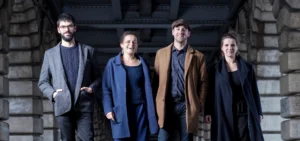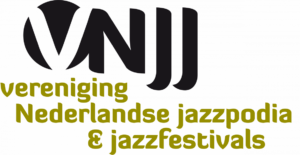Za 11 november 2023 | 20.30 u | Toegang €16,- Studenten €10,-
Onderdeel van The Records On Tour / Powered by VNJJ & Keep an Eye Foundation
Bevrijdende, onconventionele jazzcomposities
Het Nefertiti kwartet is vernoemd naar de compositie van Wayne Shorter, de muzikale poëet wiens dromen hun uiting vinden in de meest ongewone melodiëen.
Let’s celebrate! Nefertiti bestaat dit jaar precies tien jaar. Een unicum voor zo’n jonge jazzband. Met hun vierde album Live in Paris (de stad waar de bandleden elkaar voor het eerst ontmoetten) vieren ze de hoogtepunten van het afgelopen decennium.
En daarbij wordt – op zoek naar avontuur en muzikale ontdekkingen – volop uitgedaagd en geïnspireerd. Van zingbare melodieën naar energieke free jazz – paradoxaal en tegelijk herkenbaar en ‘bevrijdend’. Met Live in Paris gaan ze zelfs voor nog meer vrijheid en improvisatie dan met hun eerdere albums.
Je kunt er niet om heen: Nefertiti bezit een groot talent om je helemaal mee te nemen in de energie van het moment. Deze hechte groep musici én vrienden durft met traditionele instrumentatie (sax, piano, contrabas en drums) voor onconventionele jazzcomposities te kiezen.
“The masterful interplay of the four musicians of this gender-equal unit contained all achievements of modern North American jazz in a highly developed manner and offered highly precise soloing”. Henning Bolte
Pedro Ivo Ferreira contrabas / Camille Maussion saxen / Delphine Deau piano / Pierre Demange drums
The quartet Nefertiti takes its name from the composition by Wayne Shorter, the musical poet whose dreams find their expression in such improbably shaped melodic lines. The group draws on that idea in the passion they have for working on the form of compositions. The band which started in 2013 between the walls of the conservatory in Paris might look like a classic jazz quartet, and these are indeed superb players, but appearances can be deceptive. We could not be further removed here from those endless repetitions of ‘chorus – improvised solos – chorus again’.
In Nefertiti, there is a very different dramaturgy. The form appears only when it needs to, after preliminary frolicking and shadow-play. Then, and only then, does the composition move forward. In a paradoxical and very appealing way, it is liberating. And that is because, once the free sounds have created their own tension, the arrival of melody and pulse brings certainty; and yet the line has the liberty to zigzag, to whirl about, and to be peppered with polyrhythms. ALEX DUTILH


